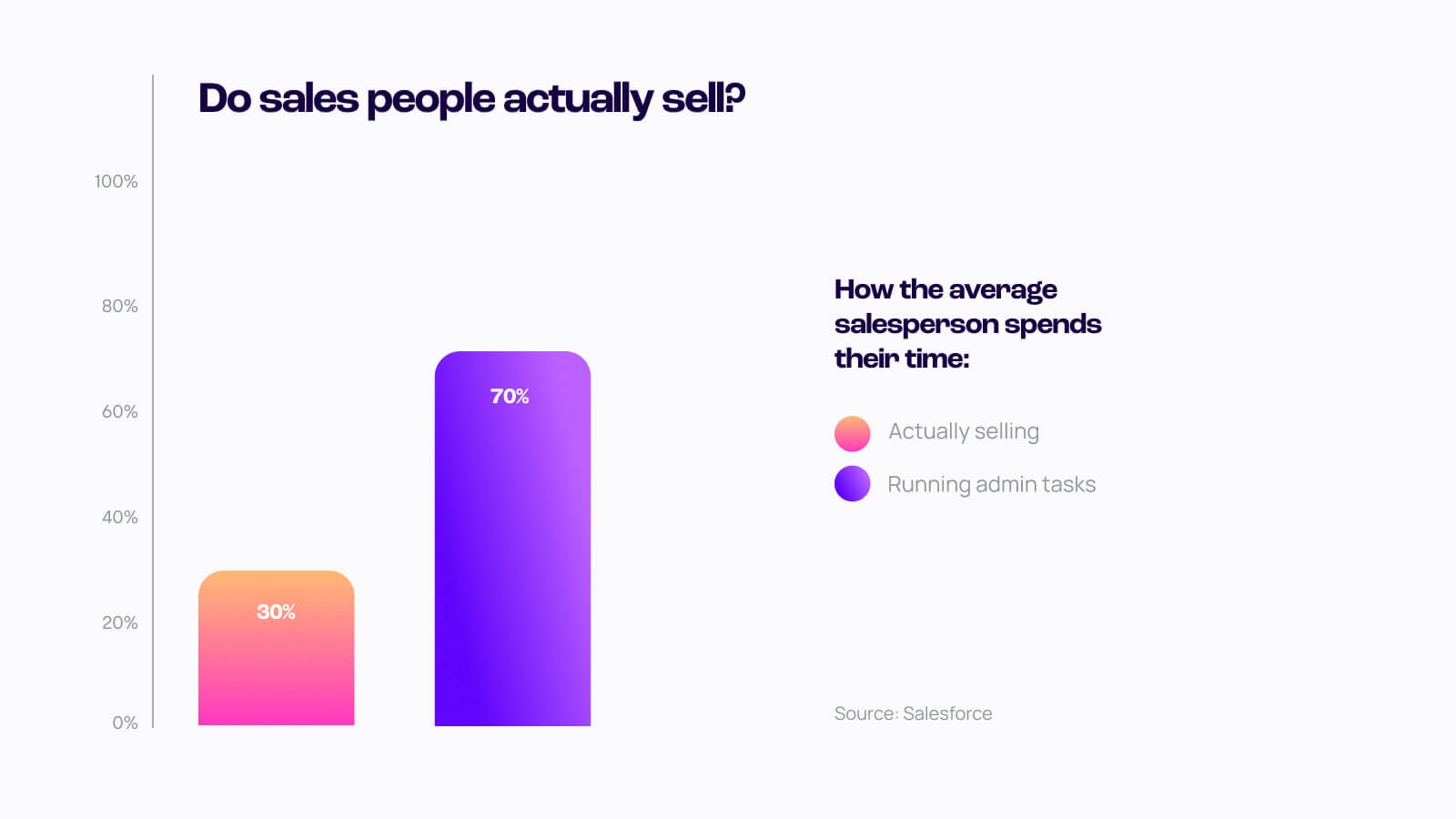
Is AI Killing Sales & Leadership Jobs — or Creating the Best Roles Yet?
Artificial intelligence (AI) is reshaping how professionals sell, grow businesses and lead teams — but rather than eliminating jobs, it’s creating new ones.
Gartner predicts that 95% of sales research and prospecting workflows will begin with AI by 2027, yet humans remain central to relationship-building, negotiation and leadership. From automating outreach to interpreting insights, AI is becoming the ultimate assistant — not a replacement.
This guide explores how AI is transforming sales, business development and leadership careers, the skills employers now value most, and how you can future-proof your career in this evolving space.
Why AI Is Transforming Sales, Business Development & Leadership
Artificial intelligence is not a passing trend. It’s the backbone of how modern companies operate, communicate, and compete. In sales, business development and leadership, the shift from manual effort to intelligent automation has redefined what success looks like.
From Gut Instinct to Guided Intelligence
For decades, sales teams relied on gut instinct and experience to close deals. Today, AI transforms those instincts into actionable insights.
Predictive analytics and real-time data analysis help professionals make informed decisions faster — showing who to contact, when to reach out, and what message will resonate.
Instead of manually analysing customer relationships or guessing what prospects want, AI models integrate directly into sales processes, surfacing trends from thousands of interactions. This doesn’t eliminate intuition — it enhances real-world decision-making, giving every rep a competitive edge through evidence-based selling.
AI has turned what used to be educated guesses into measurable confidence.
Replacing Repetition With Efficiency
The average salesperson spends less than 30% of their time actually selling; they spend the remaining 70% logging data, preparing reports, and performing repetitive administrative tasks. AI eliminates much of this busywork, giving professionals back their most precious resource — time.

Instead of spending an hour typing up notes after a meeting, tools like Gong or Fireflies can automatically transcribe and summarize calls, capturing every key insight. Instead of building outreach lists manually, AI can generate personalized prospect lists based on ideal customer profiles.
By freeing professionals from low-impact tasks, AI gives them the bandwidth to focus on strategy, creativity and connection — areas where humans shine.
The Human Element Still Rules
The presence of AI does not make humans less valuable. It makes human skills more visible.
Clients still crave authenticity. Teams still rely on empathy. Decision-making still requires context and courage.
Technology can surface opportunities, but only humans can seize them with nuance and personality. Leverage AI technology to accelerate opportunities, but close with the human touch.
The New Definition of High Performance
Success in sales or leadership is no longer about who works the longest hours — it’s about who works the smartest. The professionals who will thrive in this new landscape are those who combine analytical precision with human creativity.
AI is not the enemy of ambition. It’s the amplifier.
Working With AI in Sales Jobs 🤑
AI isn’t just reshaping how we sell — it’s redefining what sales careers look like.
From remote AI sales jobs that blend tech fluency with communication skills, to hybrid AI sales operations roles focused on data-driven strategy, the opportunities are multiplying. AI in sales operations has taken the guesswork out of prospecting and turned relationship management into a data-powered art.
For anyone wondering how to use AI in sales, start by mastering tools that automate outreach, forecast performance, and generate predictive insights — freeing time for the human side of selling: empathy, persuasion, and relationships.
Sales remains one of the most human professions, yet it’s also becoming one of the most technologically advanced, so a careful balance puts you at an advantage.
The Automation Advantage
Imagine your entire outreach process running while you sleep. AI can track customer behavior, score leads, and schedule follow-ups automatically. When you log in the next morning, you see an updated pipeline, and highlighted top priorities.
Automation is not about removing people — it’s about removing inefficiency. By handling repetitive processes, AI helps sales professionals focus on conversations that matter.
Even small automations make a big difference. Automatically logging calls, predicting deal timelines, and suggesting personalized email subject lines can collectively improve productivity by double digits.
When implemented effectively, AI doesn’t just save time — it transforms the way teams sell. Modern organisations leverage AI to streamline lead generation, manage customer relationships, and personalise outreach at scale.
By integrating AI solutions into everyday workflows, sales leaders gain predictive visibility into pipelines, uncover new opportunities, and improve product recommendations that drive conversions.
The result?
A more agile, data-driven sales culture built on collaboration, insight, and smarter sales strategies.
Tools of the Trade
The AI tool stack for sales continues to grow every month. Here are a few standout categories:
- Prospecting assistants: Apollo, Clay, and Cognism analyze thousands of profiles to identify prospects who match your ideal customer profile.
- CRM copilots: HubSpot and Salesforce use AI to generate insights and summarize interactions.
- Conversation intelligence: Gong and Chorus transcribe calls and reveal which phrases or questions lead to successful outcomes.
- Writing assistants: Tools like Lavender and Copy.ai help reps personalize outreach at scale without losing tone or warmth.
Sales professionals who learn how to use these systems can outperform their peers who rely solely on manual effort.
Why Emotional Intelligence Still Wins
AI can write a decent sales email, but it cannot replace human authenticity. A prospect usually makes a decision based on trust, and trust is built through emotional intelligence — listening, understanding tone, and responding with empathy.
A good salesperson reads between the lines. They sense hesitation, interpret silence, and know when to push or pause. These instincts are deeply human and remain irreplaceable, even in an AI-powered world.
Emerging Hybrid Roles
AI has not reduced job opportunities — it has diversified them. New hybrid sales roles are now in high demand, including:
- AI Sales Analyst — professionals who interpret AI data, monitor lead quality, and optimize pipeline strategies.
- Sales Operations Specialist — analysts who build and manage automation systems that improve team performance.
- Digital Account Strategist — experts who blend relationship-building with AI-driven campaign execution.
These careers combine traditional sales skills with a modern data-driven mindset, creating room for both creative and analytical thinkers.
The Remote Edge
AI tools are the backbone of modern remote sales teams. With automation handling reporting, reminders and insights, teams can collaborate across time zones with ease.
Video calls are automatically transcribed, Slack conversations summarized, and dashboards updated in real time. Reps in different countries can sell to the same clients without missing a beat.
Remote work once made sales challenging due to communication gaps. Now, AI bridges those gaps, creating an environment where global teams can sell together — seamlessly and intelligently.
Working With Artificial Intelligence in Business Development 💼
Artificial intelligence in business development is more than automation — it’s amplification.
Business development (BD) has always required a mix of strategic thinking and relationship-building; AI has simply made that combination more powerful.
Now, Sales Leaders use AI for business development to identify new markets, qualify leads faster, and design smarter sales funnels. Those who learn how to use AI to boost sales can scale impact without scaling headcount, using real-time analytics to refine strategy and build trust with customers.
This blend of human leadership and machine intelligence is setting the new standard for growth-focused teams.
🤓 Smarter Market Discovery
AI has become the compass of BD teams. It can scan industry databases, social platforms and news outlets to identify potential partners or expansion markets in seconds.
For example, if a tech company wants to target startups that recently raised funding, AI can pull that data instantly, segment it by region, and even suggest warm introductions based on shared contacts.
That kind of precision was once impossible without an entire research department. Now it happens in minutes.
📈 Predictive Strategy in Action
Predictive analytics is revolutionizing how BD leaders make decisions. By analyzing years of historical performance and external market data, AI can model which partnerships will likely deliver the highest return.
These systems can evaluate hundreds of variables — customer overlap, product fit, and timing — to recommend the best path forward. It’s not about removing human judgment; it’s about informing it with better information.
A BD professional who uses predictive analytics can create proposals that align perfectly with client needs. They can prioritize opportunities with confidence rather than instinct, and therefore close more deals.

🤝 Human Strengths in Relationship-Building
Even as AI handles the data, the magic of BD lies in the human touch. Negotiation, credibility, and intuition are still the cornerstones of influence.
AI can write a proposal outline, but only people can read a room, build rapport and manage emotions during complex deals. The best professionals know how to merge AI’s efficiency with their emotional intelligence to create genuine partnerships.
🌱 Emerging BD Career Opportunities
Companies now hire specialists whose entire job is to bridge strategy and AI insights. Common examples include:
- Growth Intelligence Partner — professionals who monitor market shifts and translate insights into actionable growth plans.
- AI Strategy Consultant — experts who design digital transformation roadmaps for client partnerships.
- Revenue Operations Analyst — specialists who align marketing, sales and BD through automation and analytics.
These roles reward curiosity, analytical thinking and communication — qualities that transcend traditional job titles.
💟 Soft Skills Still Drive Success
AI cannot navigate human complexity. Cultural awareness, adaptability and storytelling still separate the great from the good.
When pursuing partnerships in new markets, understanding cultural context or subtle communication differences can determine whether a deal succeeds or fails. AI can provide insights, but empathy provides impact.
Professionals who can blend quantitative reasoning with emotional awareness will lead the next generation of business growth.
Working With AI in Leadership 👉
Leadership is evolving faster than ever. The best leaders today use AI not just for efficiency but for vision — to make smarter decisions, build stronger teams and lead with greater empathy.
Adopting an AI-First Mindset
An AI-first leader views technology as an ally. They are curious rather than fearful, and they experiment, automate and continuously learn.
This mindset is critical because AI is now part of every decision-making process. Whether it’s predicting quarterly revenue, tracking employee sentiment, or modeling new product launches, data now informs every move.
The most effective leaders use AI not to control their teams but to empower them. They use analytics to identify roadblocks early, personalize feedback, and allocate resources more strategically.
Leadership Evolution Through AI
AI’s real value lies in its ability to enhance human judgment. By offering pattern recognition and simulations, it enables leaders to anticipate outcomes before they happen.
For example, workforce analytics can predict which departments are at risk of burnout. AI dashboards can monitor performance trends and alert leaders to declining engagement. This allows intervention before problems escalate.
Rather than replacing intuition, AI strengthens it by grounding it in evidence.
Empathy as a Competitive Edge
As automation grows, empathy has become the defining trait of great leadership. People want to feel understood, not managed. Leaders who use AI to streamline workflows while maintaining personal connection inspire greater loyalty and creativity.
AI can tell you who’s underperforming. It can’t tell you why. Only human connection uncovers the reason behind the data. That’s why empathy — not efficiency — will determine the next generation of successful leaders.
New Leadership Roles Emerging
Organizations are recognizing that leading through AI requires new expertise. Titles like:
- AI Transformation Lead — guiding adoption across teams and ensuring alignment with business goals.
- People Analytics Manager — turning employee data into actionable insights for culture and engagement.
- Ethical AI Advisor — ensuring technology decisions remain responsible and fair.
These positions demonstrate that the intersection of data and empathy is the new frontier of leadership.
Leading Remote Teams With AI
Remote leadership has always been challenging because culture can feel distant. But AI is bridging that divide.
Performance dashboards give visibility without micromanagement. Sentiment analysis tools help leaders gauge team morale. AI assistants can summarize meeting notes and track follow-up actions.
When combined with genuine communication — weekly check-ins, transparent goal-setting, and recognition — leaders can maintain human warmth even across continents.
The most successful leaders use AI to augment their empathy, not replace it.
New Career Opportunities Across Sales, BD & Leadership 👀
AI has created entirely new career paths that blend technology with human intuition.
The Rise of Hybrid Professionals
The future belongs to professionals who can merge human understanding with technical fluency. These individuals bridge the gap between data and decision-making.
Roles such as AI Sales Strategist, Growth Intelligence Partner, and RevOps Automation Lead are now common in growing companies. Each requires a balance of analysis, communication, and creativity.
Hybrid professionals are the translators between technology and the customer. They don’t just use tools — they shape how teams use them.

Remote-First Companies Leading the Change
Companies like HubSpot, Salesforce, Gong and Outreach have embraced AI-powered operations across their remote teams. They rely on data to track performance but continue to emphasize human connection as their cultural core.
These organizations are not replacing people with software. They are expanding opportunities by enabling flexible, remote careers powered by AI collaboration.
Training Pathways for Future-Ready Talent
The fastest way to future-proof your career is through continuous learning. Modern training options make AI education more accessible than ever.
- HubSpot Academy offers practical certifications in AI for Sales and Marketing.
- Coursera provides courses in AI for Business Leaders and Data Literacy.
- LinkedIn Learning teaches professionals how to implement AI tools in real-world commercial challenges.
- Udemy and Google Cloud Skills Boost also provide short programs focused on prompt engineering, analytics and automation.
Learning even one new AI skill can set you apart in competitive job markets, especially for remote-first companies that reward initiative.
Skills to Future-Proof Your Career
Technology evolves rapidly, but one truth remains: people who adapt win. Here’s how to prepare for an AI-driven future.
Human Skills Are Irreplaceable
The more automated work becomes, the more valuable human judgment becomes. Skills such as communication, empathy, storytelling and influence define how professionals stand out in an AI-saturated market.
When everyone has access to the same tools, human creativity becomes the ultimate differentiator.
AI Literacy as the New Baseline
You don’t need to be a data scientist, but you do need to understand how AI works. Learn how to design prompts that yield quality results, how to interpret analytics dashboards, and how to automate repetitive workflows.
Knowing what to automate — and what not to — is a career-defining skill.
Leadership for the AI Era
Future leaders will be those who can guide adoption with confidence, ethics and emotional awareness. They will ensure AI serves people, not the other way around.
The best leaders will blend technology management with coaching and storytelling. This helps teams understand why AI matters — not just how it works.
Your Action Plan
- Audit your workflow. Identify what tasks you can automate with AI to save time.
- Upskill strategically. Choose one AI-related tool to master each quarter.
- Document your results. Showcase how AI has improved your performance.
- Network with AI-ready peers. Join online communities that share use cases and best practices.
The professionals who take initiative today will become the AI mentors of tomorrow.
Lead With AI, Not Against It
AI is not replacing sales, business development or leadership roles — it’s redefining them. The most successful professionals use AI to enhance creativity, build deeper relationships and lead with sharper insight.
In today’s remote-first world, the competitive edge belongs to those who merge data with empathy. The future of work is not a choice between man or machine — it’s the collaboration of both.
Ready to build your AI-powered career in sales or leadership?
Visit the Paybump Career Hub to explore remote AI-enabled job listings, tailored training resources and expert insights.
And subscribe to the Paybump newsletter for weekly updates on AI, careers and remote work opportunities.
FAQs
Will AI replace sales, BD and leadership professionals?
No — AI automates admin and data analysis, but humans still lead when it comes to communication, judgment and persuasion.
What jobs are emerging due to AI in sales and leadership?
New hybrid roles such as AI Sales Analyst, Growth Intelligence Partner, RevOps Lead and AI Transformation Manager.
How can I start using AI in my current role?
Step 1: Experiment with CRM automations, AI-driven analytics, and outreach tools. Step 2: Focus on using those insights to strengthen human relationships.
What skills will keep me competitive in the AI era?
Emotional intelligence, adaptability and digital literacy are now as vital as sales or leadership experience.
Are leadership roles at risk of automation?
No — AI provides data, but leadership still requires empathy, strategy and the ability to inspire teams through change.






